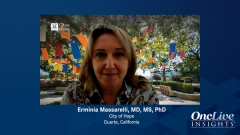
NSCLC: Overcoming Barriers to Testing and Molecular Profiling
Erminia Massarelli, MD, MS, PhD, shares insight on potential barriers to appropriate molecular testing in patients with non–small cell lung cancer.
Episodes in this series

Transcript:
Erminia Massarelli, MD, MS, PhD: The current gap in molecular testing is related to 2 large categories of reasons. One is insufficient tissue because, unfortunately, metastatic non–small cell lung cancer is found by small biopsies. Very frequently they’re found only with FNAs [fine needle aspiration biopsies], which are taken during bronchoscopies. Therefore, there isn’t enough material to conduct molecular testing, especially on the ones that come back in a stepwise-type of testing. This means there are some institutions, providers, and pathologists that will go first with EGFR-mutation testing. If those are negative, then they’ll then go with some sequence testing.
Unfortunately, stepwise testing requires many unstained slides. The majority of non–small cell lung cancers aren’t found from biopsy alone. The tumor isn’t very abundant. I advise to do NGS [next-generation sequencing], which is comprehensive genomic sequencing. With NGS, you save material from the comprehensive landscape of what the cancer in that moment is expressing.
You can find both mutations and no mutations, which will be handy in the future.
Ten years ago, we didn’t know about intrafusions or STK11 mutations. For many decades, we were unable to target these mutations. More recently, with FDA approval, we can target the kinase G12 specific inhibitor. NGS testing on a patient is like gold at the moment. I encourage my colleagues to order NGS as early as possible so mutations are still in the early stage of small cell lung cancer. If we do the test broadly, we can find many other mutations that could potentially help these patients not only in the future but also in the immediate future, because we have many ongoing clinical trials open in adjuvant setting.
The other thing providing some barriers to molecular testing is that PD-L1 tests are easily accessible because they’re done by immunohistochemistry and require only a few slides of the tumor block. Therefore, if a provider does PD-L1 testing without doing any NGS molecular testing, and the PD-L1 is high, the patient might be treated with immunotherapy. For patients with EGFR and other types of mutations, that’s not the best way to start treatment in metastatic noncurable settings.
I encourage requesting molecular testing on tissue biopsies. If molecular testing isn’t available, there’s also the option of liquid biopsies, which is approved by the majority of insurance carriers in the metastatic noncurable setting. For early stage, we can do molecular testing on either the surgical resection or on the biopsy that’s done for diagnosis if surgical resection isn’t available.
Transcript edited for clarity.






































